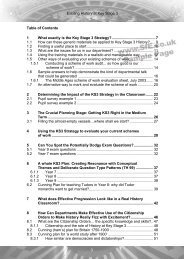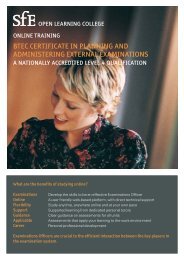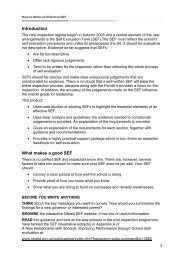The departmental handbook checklist Schemes of work - SfE
The departmental handbook checklist Schemes of work - SfE
The departmental handbook checklist Schemes of work - SfE
Create successful ePaper yourself
Turn your PDF publications into a flip-book with our unique Google optimized e-Paper software.
Leading and Managing a Successful Music Department<br />
<strong>The</strong> <strong>departmental</strong> <strong>handbook</strong> <strong>checklist</strong><br />
Essential ingredients:<br />
A subject policy statement that is fully reflected in everything you do<br />
Examination performance analysis for the last 3 years<br />
Departmental action plan linked to the school development plan<br />
Clear explanations on how teaching and learning are monitored<br />
(including visiting tutors)<br />
Evidence how the subject meets National Curriculum requirements<br />
Extra-curricular information including visiting tutors<br />
Curriculum details – teaching groups etc<br />
Policies linked to whole school policies<br />
Additional information such as schemes <strong>of</strong> <strong>work</strong>, meeting minutes,<br />
lesson observation records can be included in an annex<br />
6<br />
Additional Policies<br />
<strong>Schemes</strong> <strong>of</strong> <strong>work</strong><br />
This should be a <strong>work</strong>ing document, full <strong>of</strong> revisions and crossing-outs.<br />
Inspectors become worried when they see freshly printed, untouched copies <strong>of</strong><br />
documents that should be used frequently and reviewed constantly.<br />
Most music departments use a combination <strong>of</strong> their own materials and the QCA<br />
guidance units. Inspectors will not be concerned with the order in which you<br />
have chosen to deliver the programmes <strong>of</strong> study <strong>of</strong> the national curriculum.<br />
<strong>The</strong>y will expect to see that all aspects <strong>of</strong> the requirements are being delivered.<br />
You may have the most creative, exciting and enjoyable curriculum in the world,<br />
but if it does not cover the national curriculum requirements, the judgement for<br />
leadership and management will be unsatisfactory or worse, and the judgement<br />
for the overall provision <strong>of</strong> music will probably be one <strong>of</strong> unsatisfactory.<br />
If you are not using the QCA schemes, you should be prepared to show that<br />
your materials are effective and ensure the pupils achieve as well as possible.<br />
<strong>The</strong> best schemes <strong>of</strong> <strong>work</strong> are those that combine the finest bits from the QCA<br />
guidance with original purpose-built materials. If you rely solely on ‘Music<br />
Matters’ as your scheme <strong>of</strong> <strong>work</strong>, you are asking for trouble!<br />
Do not, however, throw away all the really good lesson material you used<br />
before the national curriculum changed. Music lessons still require high quality,<br />
practical and creative activities at their core. Many teachers just completely<br />
revise their schemes each year and remove far too much useful material. This<br />
is not good practice and causes a great deal <strong>of</strong> unnecessary extra <strong>work</strong>.<br />
<strong>Schemes</strong> need to be structured in a logical way. Clear progression must be<br />
evident so that pupils’ progress can be tracked from year 7 to year 9. It is not<br />
acceptable for the pupils in year 9 to be doing exactly the same lessons as<br />
those in year 7, no matter what you say about them doing it at a higher level.<br />
Achievement is a major focus <strong>of</strong> an inspection and a judgement that inspectors<br />
find very difficult to make. Do not make it any harder for them by treating all<br />
pupils to the same educational diet in every year.<br />
50<br />
www.sfe.co.uk
Leading and Managing a Successful Music Department<br />
Section 7: Effective Self-evaluation<br />
<strong>The</strong>re is an increased requirement for schools to be accurate in their own selfevaluation.<br />
<strong>The</strong>re has been a shift towards managerial self-evaluation. Middle<br />
managers are expected to evaluate the successes and needs <strong>of</strong> their<br />
departments/faculties as well as their own performance. As middle managers<br />
assume greater responsibility for teaching and learning within their department,<br />
they are increasingly under scrutiny from inspection teams. This principle<br />
should be carried through to subject departments. Before any inspection, it is<br />
good practice to evaluate your strengths and weaknesses in order to be fully<br />
aware <strong>of</strong> how well your department is doing. Schools have to fill in a form S4<br />
that is a detailed self-evaluation. Music departments could do the same. A<br />
possible process for effective self-evaluation follows.<br />
Standards and achievement<br />
Read the previous inspection report carefully to gather information about<br />
standards and achievement at that time. This is the main benchmark inspectors<br />
will use to judge progress or improvement since the last inspection. Check the<br />
judgements about standards and achievement carefully at all key stages.<br />
Compare these to your last examination results and current standards.<br />
Inspectors will judge standards by observation <strong>of</strong> lessons, discussion with<br />
pupils, scrutiny <strong>of</strong> written and recorded <strong>work</strong> and participation in extra-curricular<br />
music groups. <strong>The</strong>y will judge pupils’ achievement by considering whether<br />
standards in music are high enough, taking into account the pupils’ starting<br />
points or capabilities, the progress they make over time and the demands made<br />
on them. <strong>The</strong>y will look closely for significant differences in achievement<br />
between groups <strong>of</strong> pupils, such as boys and girls, pupils <strong>of</strong> different ethnic<br />
heritage, those with English as an additional language, Traveller children, those<br />
with special educational needs, and those pupils identified as particularly gifted<br />
and talented.<br />
In order to produce an effective self-evaluation <strong>of</strong> your department, you will<br />
need to answer the following questions:<br />
What is distinctive about your department?<br />
Here you will need to state the most important characteristics <strong>of</strong> your<br />
department. Keep it short and succinct, but tell the inspector what is really good<br />
about it.<br />
Effective Self-evaluation<br />
7<br />
How effective is your department overall?<br />
Give an honest self-evaluation <strong>of</strong> the performance <strong>of</strong> your subject in all areas.<br />
How do you know?<br />
Explain the methods you have used to evaluate your department’s performance<br />
in all its <strong>work</strong>.<br />
What are its notable strengths?<br />
Make a concise list <strong>of</strong> all the real strengths. This can be classroom or extracurricular.<br />
Remember that the focus <strong>of</strong> the inspection is on what goes on in the<br />
classroom. You may have the best school band in the country but if you are not<br />
www.sfe.co.uk<br />
53
Leading and Managing a Successful Music Department<br />
How well are pupils cared for, guided and supported?<br />
Explain any particular features <strong>of</strong> pastoral care your department excels in or<br />
struggles with. Mention extra-curricular activities.<br />
How well does the school <strong>work</strong> in partnership with parents, other schools<br />
and the community?<br />
List any surveys or questionnaires you may have carried out. Mention parental<br />
support for extra-curricular events and the level <strong>of</strong> support given by pupils.<br />
How effective is the leadership and management <strong>of</strong> the department?<br />
You are talking about all aspects here, not just yourself. This includes your line<br />
management as well as your own duties.<br />
Explain the strengths and the areas for improvement. Give detailed information<br />
about how you monitor teaching <strong>of</strong> your department, including the visiting tutors.<br />
Which aspects <strong>of</strong> managing the performance <strong>of</strong> the department <strong>work</strong> best,<br />
and why?<br />
Make reference to any examination analysis undertaken, and in particular the<br />
monitoring <strong>of</strong> teaching.<br />
What are the most significant aids or barriers to raising achievement?<br />
State clearly what really makes your department successful. Resist the<br />
temptation to mention lack <strong>of</strong> resources unless you can prove the negative<br />
impact <strong>of</strong> this.<br />
Head <strong>of</strong> department self-evaluation <strong>checklist</strong><br />
Do I constantly challenge poor and ineffective teaching?<br />
Is ‘Teaching and Learning’ the focus <strong>of</strong> <strong>departmental</strong> meetings and<br />
discussions?<br />
Do I understand what constitutes a poor, satisfactory, good, very good<br />
or excellent lesson?<br />
Are members <strong>of</strong> the music department clear regarding the definition <strong>of</strong><br />
a poor, satisfactory, good, very good or excellent lesson? How do I<br />
know?<br />
Do <strong>departmental</strong> staff implement changes to their teaching based on<br />
feedback from the head <strong>of</strong> department and other staff? How do I know?<br />
As a head <strong>of</strong> department, am I happy to receive feedback (positive or<br />
negative) on lessons which <strong>departmental</strong> staff have observed?<br />
Do staff within the department understand that teaching and especially<br />
pupil learning are our top priorities?<br />
Am I prepared to critically examine a colleague’s lesson and give<br />
honest and direct feedback?<br />
Have I helped the department to build a system for the sharing <strong>of</strong> good<br />
practice and ideas?<br />
Effective Self-evaluation<br />
7<br />
www.sfe.co.uk<br />
57
Leading and Managing a Successful Music Department<br />
Section 9: During the inspection<br />
<strong>The</strong> week <strong>of</strong> the inspection passes very quickly. Because music is an option<br />
subject at KS4, it usually gets a significantly reduced coverage by the<br />
inspectors compared to the core subjects <strong>of</strong> English, maths and science. In<br />
most inspections, there are only 2 days allocated to the inspection <strong>of</strong> music.<br />
<strong>The</strong> music inspector may only be in school for two days and focus entirely on<br />
music in that time or they might be inspecting another subject or aspect in<br />
addition to music and be in the school for the duration <strong>of</strong> the whole inspection.<br />
<strong>The</strong> spirit <strong>of</strong> the current inspection frame<strong>work</strong> encourages a more holistic<br />
approach to the inspection process, so most lead inspectors keep as many <strong>of</strong><br />
their colleagues in school for as long as possible.<br />
Make sure that you have prepared your lesson plans and have your<br />
documentation ready for inspection. Think through the lessons for the week and<br />
check that you have arranged all the necessary resources. Remind the<br />
instrumental teachers that they are likely to be observed and check that they<br />
have adequate documentation. Make sure that you have told your other subject<br />
colleagues that the instrumental tuition is an important part <strong>of</strong> your provision<br />
and that they must allow pupils to attend lessons during the inspection week or<br />
it will not look good for the whole school.<br />
Lesson observation<br />
Inspectors have to spend approximately 60% <strong>of</strong> their time gaining first hand<br />
evidence. This can be discussion with pupils, scrutiny <strong>of</strong> <strong>work</strong> and <strong>of</strong> course<br />
through lesson observation.<br />
<strong>The</strong> main source <strong>of</strong> evidence is lesson observation. Inspectors will focus on<br />
classes not teachers. This means there is <strong>of</strong>ten an unequal distribution <strong>of</strong><br />
observations during an inspection. Music departments tend to have the most<br />
observed teachers <strong>of</strong> all subjects. This is because traditionally music<br />
departments are quite small with a surprisingly high number having only one<br />
teacher in the department.<br />
Inspectors focus on the end <strong>of</strong> key stage classes. It is here where they have to<br />
make their judgements about standards. Inspectors are more likely to see year<br />
9 classes than year 8. In key stage 4 they will try to focus on year 11 rather than<br />
10 and in the sixth form year 13 is the one they target.<br />
During a lesson observation, inspectors are required to make judgements on<br />
the following areas:<br />
• Standards – this is compared to the national picture<br />
• Achievement – this is based on how well the pupils are doing compared<br />
with their prior knowledge and attainment<br />
• Teaching – the impact on learning <strong>of</strong> everything the teacher does<br />
throughout the lesson<br />
• Learning – how well the pupils actually acquire new skills, understanding<br />
and knowledge during the lesson<br />
During the Inspection<br />
9<br />
www.sfe.co.uk<br />
65








